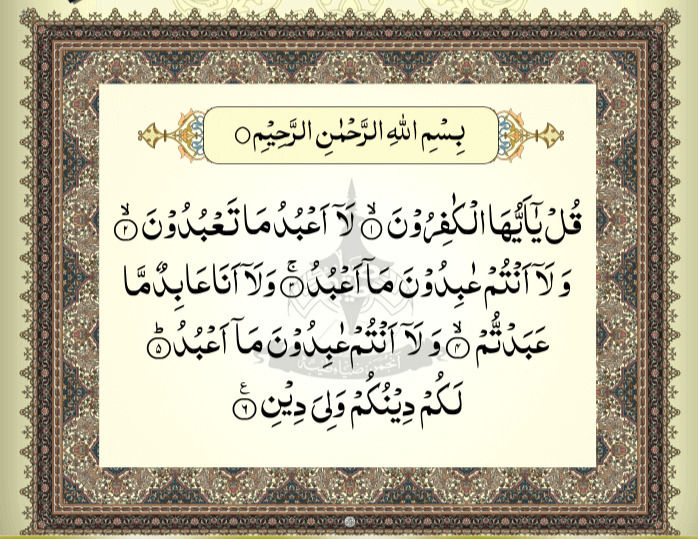What are the surahs of Refuge and Sincerity?
- Al-Mohsinun
- Oct 30, 2020
- 4 min read
Surah Al-Falaq and An-Naas are two of the most powerful surahs called “Al-Mu'awwadhatayn,” the two cries for refuge & protection. Surahs al-Kafirun and al-Ikhlas together are called “Ikhlasayn,” surahs of sincerity or worship.

Mu'awwidhatain (Two Surahs Seeking Refuge with Allah)
It was narrated from Mu'adh bin 'Abdullah bin Khubaib that his father said: "I was with the Messenger of Allah [SAW] on the road to Makkah when I found myself alone with the Messenger of Allah [SAW]. I drew close to him and he said: 'Say.' I said: 'What should I say?' He said: 'Say.' I said: 'What should I say?' He said: 'Say: I seek refuge with (Allah) the Lord of the daybreak...' until he finished (the Surah), then he said: 'Say: I seek refuge with (Allah) the Lord of mankind...' until he finished it. Then he said: 'The people cannot seek refuge with Allah by means of anything better than these two.'" (Grade: Hasan)
أَخْبَرَنَا يُونُسُ بْنُ عَبْدِ الأَعْلَى، قَالَ حَدَّثَنَا ابْنُ وَهْبٍ، قَالَ أَخْبَرَنِي حَفْصُ بْنُ مَيْسَرَةَ، عَنْ زَيْدِ بْنِ أَسْلَمَ، عَنْ مُعَاذِ بْنِ عَبْدِ اللَّهِ بْنِ خُبَيْبٍ، عَنْ أَبِيهِ، قَالَ كُنْتُ مَعَ رَسُولِ اللَّهِ صلى الله عليه وسلم فِي طَرِيقِ مَكَّةَ فَأَصَبْتُ خَلْوَةً مِنْ رَسُولِ اللَّهِ صلى الله عليه وسلم فَدَنَوْتُ مِنْهُ فَقَالَ " قُلْ " . فَقُلْتُ مَا أَقُولُ قَالَ " قُلْ " . قُلْتُ مَا أَقُولُ قَالَ " { قُلْ أَعُوذُ بِرَبِّ الْفَلَقِ } " . حَتَّى خَتَمَهَا ثُمَّ قَالَ " { قُلْ أَعُوذُ بِرَبِّ النَّاسِ } " . حَتَّى خَتَمَهَا ثُمَّ قَالَ " مَا تَعَوَّذَ النَّاسُ بِأَفْضَلَ مِنْهُمَا ".
Reference: Sunan an-Nasa'i 5429; Book 50, Hadith 2; Vol. 6, Book 50, Hadith 5431


Another hadith narrated by Aisha, Ummul Mu'minin: AbdulAziz ibn Jurayj said: I asked Aisha, mother of the believers: With which (surah) the Messenger of Allah (ﷺ) used to observe witr? (She reported same as in the Hadith of Ubayy ibn Ka'b, No. 1418) This version adds: In the third rak'ah he would recite: "Say, He is Allah, the One" (Surah 112), and "Say, I seek refuge in the Lord of daybreak" (Surah 113), and "Say, I seek refuge in the Lord of mankind" (Surah 114). Grade: Sahih
حَدَّثَنَا أَحْمَدُ بْنُ أَبِي شُعَيْبٍ، حَدَّثَنَا مُحَمَّدُ بْنُ سَلَمَةَ، حَدَّثَنَا خُصَيْفٌ، عَنْ عَبْدِ الْعَزِيزِ بْنِ جُرَيْجٍ، قَالَ سَأَلْتُ عَائِشَةَ أُمَّ الْمُؤْمِنِينَ بِأَىِّ شَىْءٍ كَانَ يُوتِرُ رَسُولُ اللَّهِ صلى الله عليه وسلم فَذَكَرَ مَعْنَاهُ قَالَ وَفِي الثَّالِثَةِ بِـ { قُلْ هُوَ اللَّهُ أَحَدٌ } وَالْمُعَوِّذَتَيْنِ .
Reference: Sunan Abi Dawud 1424; Book 8, Hadith 9; Book 8, Hadith 1419
It was also narrated that ‘Ali (رضي الله عنه) said: The Messenger of Allah (ﷺ) used to pray Witr reciting nine surahs from Al-Mufassal. Aswad said: In the first rak’ah he would recite `The mutual rivalry (for piling up of worldly things) diverts you` [At-Takathur 102] and “verily, We have sent it (this Qur`an) down in the Night of Al-Qadr (Decree)` [al-Qadr 97], and `When the earth is shaken with its (final) earthquake` [az-Zalzalah 99]. In the second rak`ah he would recite `By Al-‘Asr (the time)” [Al-ʻAsr 103] and `When there comes the Help of Allah (to you, O Muhammad against your enemies) and the Conquest (of Makkah)` [An-Nasr 110] and “Verily. We have granted you (O Muhammad (ﷺ)) Al-Kawthar (a river in Paradise)` [Al-Kawthar 108]. In the third rak`ah he would recite “Say (O Muhammad to these Mushrikoon and Kafiroon): `O Al-Kafiroon (disbelievers in Allah, in His Oneness, in His Angels, in His Books, in His Messengers, in the Day of Resurrection, and in Al Qadar)!” [Al-Kafiroon 109] and “Perish the two hands of Abu Lahab (an uncle of the Prophet (ﷺ)) and perish he!` [Al-Masad 111] and `Say (O Muhammad (ﷺ)): “He is Allah, (the) One“ [Al-Ikhlas 112]. Grade: Da'if (Darussalam) because of the weakness of Al-Harith Al-A'war
حَدَّثَنَا مُحَمَّدُ بْنُ عَبْدِ اللَّهِ بْنِ الزُّبَيْرِ، وَأَسْوَدُ بْنُ عَامِرٍ، قَالَا حَدَّثَنَا إِسْرَائِيلُ، عَنْ أَبِي إِسْحَاقَ، عَنِ الْحَارِثِ، عَنْ عَلِيٍّ، رَضِيَ اللَّهُ عَنْهُ قَالَ كَانَ رَسُولُ اللَّهِ صَلَّى اللَّهُ عَلَيْهِ وَسَلَّمَ يُوتِرُ بِتِسْعِ سُوَرٍ مِنْ الْمُفَصَّلِ قَالَ أَسْوَدُ يَقْرَأُ فِي الرَّكْعَةِ الْأُولَى {أَلْهَاكُمْ التَّكَاثُرُ} وَ {إِنَّا أَنْزَلْنَاهُ فِي لَيْلَةِ الْقَدْرِ} وَ {إِذَا زُلْزِلَتْ الْأَرْضُ} وَفِي الرَّكْعَةِ الثَّانِيَةِ {وَالْعَصْرِ} وَ {إِذَا جَاءَ نَصْرُ اللَّهِ وَالْفَتْحُ} وَ {إِنَّا أَعْطَيْنَاكَ الْكَوْثَرَ} وَفِي الرَّكْعَةِ الثَّالِثَةِ {قُلْ يَا أَيُّهَا الْكَافِرُونَ} وَ {تَبَّتْ يَدَا أَبِي لَهَبٍ} وَ {قُلْ هُوَ اللَّهُ أَحَدٌ}.
Reference: Musnad Ahmad 678; Book 5, Hadith 111


Ikhlasayn (Two Surahs of Sincerity or Worship to Allah)
Narrated Ubayy ibn Ka'b: The Messenger of Allah (ﷺ) used to observe witr with (reciting) "Glorify the name of thy Lord, the most High" (Surah 87), "Say O disbelievers" (Surah 109), and "Say, He is Allah, the One, Allah, the eternally besought of all" (112). Grade: Sahih
حَدَّثَنَا عُثْمَانُ بْنُ أَبِي شَيْبَةَ، حَدَّثَنَا أَبُو حَفْصٍ الأَبَّارُ، ح وَحَدَّثَنَا إِبْرَاهِيمُ بْنُ مُوسَى، أَخْبَرَنَا مُحَمَّدُ بْنُ أَنَسٍ، - وَهَذَا لَفْظُهُ - عَنِ الأَعْمَشِ، عَنْ طَلْحَةَ، وَزُبَيْدٍ، عَنْ سَعِيدِ بْنِ عَبْدِ الرَّحْمَنِ بْنِ أَبْزَى، عَنْ أَبِيهِ، عَنْ أُبَىِّ بْنِ كَعْبٍ، قَالَ كَانَ رَسُولُ اللَّهِ صلى الله عليه وسلم يُوتِرُ بِـ { سَبِّحِ اسْمَ رَبِّكَ الأَعْلَى } وَ { قُلْ لِلَّذِينَ كَفَرُوا } وَاللَّهُ الْوَاحِدُ الصَّمَدُ .
Reference: Sunan Abi Dawud 1423; Book 8, Hadith 8; Book 8, Hadith 1418
It was also narrated that ‘Aishah said: “The Messenger of Allah (ﷺ) used to perform two Rak’ah before Fajr, and he used to say: ‘The best two Surah to recite in the two Rak’ah of Fajr are: “Say: Allah is One” [Al-Ikhlas (112)] and “Say: O you disbelievers.” [Al-Kafirun (109)] Grade: Da’if
حَدَّثَنَا أَبُو بَكْرِ بْنُ أَبِي شَيْبَةَ، حَدَّثَنَا يَزِيدُ بْنُ هَارُونَ، حَدَّثَنَا الْجُرَيْرِيُّ، عَنْ عَبْدِ اللَّهِ بْنِ شَقِيقٍ، عَنْ عَائِشَةَ، قَالَتْ كَانَ رَسُولُ اللَّهِ ـ صلى الله عليه وسلم ـ يُصَلِّي رَكْعَتَيْنِ قَبْلَ الْفَجْرِ وَكَانَ يَقُولُ " نِعْمَ السُّورَتَانِ هُمَا يُقْرَأُ بِهِمَا فِي رَكْعَتَىِ الْفَجْرِ {قُلْ هُوَ اللَّهُ أَحَدٌ} وَ {قُلْ يَا أَيُّهَا الْكَافِرُونَ} .
Reference : Book 5, Hadith 348; Vol. 1, Book 5, Hadith 1150; Book 5, Hadith 1204
Abdullah ibn Umar reported: The Messenger of Allah, peace and blessings be upon him, said, “The chapter, ‘Say: He is Allah the One,’ (112:1) is equal to one-third of the Quran. The chapter, ‘Say: O unbelievers,’ (109:1) is equal to one-fourth of the Quran.” The Prophet would recite either of them in his two cycles before dawn prayer.
In another narration, Ibn Umar said, “The Prophet would recite them in the two cycles before dawn prayer and the two cycles after sunset prayer.”
Referrence: Al-Mu’jam Al-Kabīr 13319 (Grade: Sahih li ghayrihi)
Rest Allah knows best.
Source: Sunnah.com, Quran




Comments